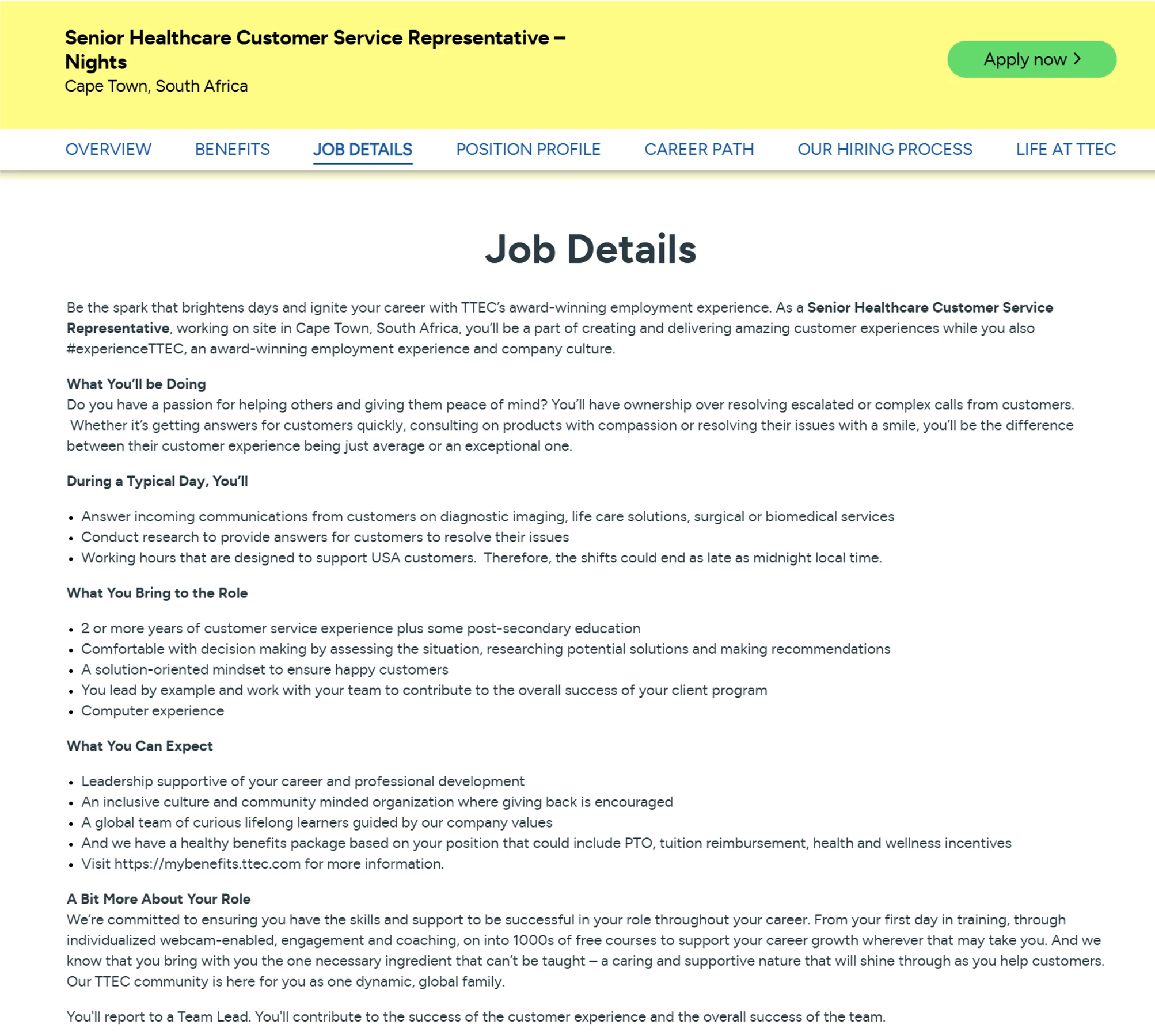Top South Africa Night Shift Jobs 2025: Requirements & Salary

04/09/2025
Key Takeaways
- Many industries rely on night shift professionals, including customer service, healthcare, manufacturing, and security, making it a valuable career path.
- Working night shifts can improve career growth, especially in industries like customer service, where 24/7 support is essential.
- Night shift roles offer great benefits, including competitive pay, career growth, and work-life balance.
- TTEC offers rewarding night shift roles in South Africa with career growth, global opportunities, and a supportive work environment.
Overview of Night Shift Jobs in South Africa 2025
South Africa's economy is expected to grow by up to 1.3% in 2025, creating around 115,000 new jobs. That means better pay and more opportunities—especially for night shift roles in major industries.
If you are looking to advance in customer service, sales, healthcare, or security services, night shifts provide valuable experience, competitive salaries, and the chance to work with global companies. If you are bilingual and ready to work in a multicultural environment, these roles can open doors to long-term career growth.
Why Consider a Night Shift Job?
- Higher earning potential with shift allowances
- Opportunities to work with international teams
- Career advancement in global industries
- A quieter, more focused work environment
Top Night Shift Jobs in South Africa
1. Healthcare Industry
The healthcare sector operates 24/7, requiring dedicated professionals to ensure patient care and support remain uninterrupted. From direct patient care to customer service roles, night shift positions in healthcare offer excellent career opportunities.
Nurses
Nurses play a critical role in healthcare, especially during night shifts. They provide medical care, monitor patient health, and respond to emergencies. This role requires strong attention to detail, the ability to work under pressure, and excellent communication skills.
- Requirements: Nursing qualification, medical knowledge, and patient care expertise.
- Salary: The average nurse salary in South Africa is around R 330000 per year.
Join TTEC: A Global Leader in Customer & Employee Experience
TTEC, a customer experience innovator, operates across 6 continents in countries such as Greece, Poland, and India, and employs over 55,000 individuals fluent in 50 languages. Our commitment to excellence is evident in our award-winning culture, highlighted by our 2024 accolades like Top 10 Operations Teams, Silver Certification in MLT’s Black Equity Program, and recognition as one of the UK’s Best Workplaces.
With an employee satisfaction rating of 4.1 out of 5 on JobStreet, we pride ourselves on creating supportive and flexible work environments that enhance both employee and customer experiences. Find a variety of client-facing and business support roles within a company that values community connections.
Find Your TTEC SparkMedical Technicians
Medical technicians operate diagnostic equipment, assist in emergency procedures, and support doctors and nurses in delivering quality patient care. This role requires technical expertise and problem-solving skills.
- Requirements: Technical training, medical equipment knowledge, and analytical skills.
- Salary: The average technician salary in South Africa is around R 206,000 per year.
Healthcare Customer Service Representatives
Customer service is essential in healthcare, ensuring patients and families receive the support they need. Healthcare customer service representatives assist with scheduling, provide medical information, and handle patient inquiries.
- Requirements: Strong communication skills, knowledge of medical terminology, and problem-solving ability.
- Salary: The average salary of a customer service representative in South Africa is around R 151,000 per year.

2. Customer Service Industry
Customer service is at the heart of many industries, with night shifts ensuring round-the-clock support for global clients. These roles provide excellent career growth and international exposure.
Call Center Agents
Call center agents handle customer inquiries, provide support, and resolve issues efficiently. They need strong interpersonal skills and the ability to multitask.
- Requirements: Excellent communication, problem-solving skills, and fluency in English.
- Salary: The average annual salary for a Call Center Agent in South Africa is R89,700.
Customer Success Specialists
Customer success professionals focus on ensuring positive customer interactions, handling feedback, and improving service quality.
- Requirements: Strong problem-solving skills, customer-centric mindset, empathy, and knowledge of customer service best practices.
- Salary: The average annual salary for a Customer Experience Specialist in South Africa is R 233,000.
Sales Support Representatives
Sales support teams play a key role in managing client accounts, coordinating orders, and ensuring smooth operations between production and customers. This role bridges customer service and sales, making it ideal for professionals with strong communication and organizational skills.
- Requirements: Knowledge of manufacturing processes, sales experience, and customer relations expertise.
- Salary: The average yearly salary for a sales support representative in South Africa is R 215,000.
Bilingual Customer Service Agents
Companies seek bilingual professionals who can assist international customers. Fluency in multiple languages increases job prospects and earning potential.
- Requirements: Fluency in English and an additional language (German, Portuguese, Danish, or French).
- Salary: The salary range for a Bilingual Customer Service Representative in South Africa is between ZAR 158,000 and ZAR 255,000 per year.

3. Security Services Industry
Security services require night shift professionals to safeguard businesses and residential areas. From frontline officers to customer support roles, the industry offers many opportunities.
Security Officers
Security officers are responsible for monitoring premises, preventing security breaches, and responding to emergencies. They must remain alert and act quickly in high-pressure situations.
- Requirements: Security certification, physical fitness, and attention to detail.
- Salary: The average salary in South Africa is R 618,000 per year.
Security Supervisors
Supervisors manage security teams, oversee patrol schedules, and ensure safety protocols are followed. This leadership role requires strong organizational and decision-making skills.
- Requirements: Leadership skills, incident management experience, and security operations knowledge.
- Salary: R 222,000 per year.
Emergency Call Center Agents
This role requires calmness under pressure and quick problem-solving.
- Requirements: Strong verbal communication, ability to work in high-stress situations, and fast decision-making skills.
- Salary: The average salary for an emergency call center worker in South Africa is R144,000 per year.
4. Manufacturing Industry
Many manufacturing facilities in South Africa operate 24/7 to meet production demands, especially in industries like automotive, food processing, textiles, and pharmaceuticals. These sectors require night shift workers to keep operations running smoothly, ensuring continuous production and timely deliveries.
Factory Workers
Factory workers operate machinery, assemble products, and maintain production efficiency. This role requires physical stamina and attention to detail.
- Requirements: Experience in factory work, ability to follow safety protocols and manual dexterity.
- Salary: The average annual salary for a factory worker in South Africa is R 11,000.
Salary estimates in this article are based on publicly available data at the time of writing and may not reflect official TTEC compensation. Refer to TTEC’s official job postings for the most accurate and up-to-date salary details.
Level Up Your Career with a Night Shift at TTEC
Looking for something different? A night shift at TTEC isn't just another job - it's a chance to build a real career while enjoying the unique benefits that come with working when the rest of the world sleeps.

Why Night Shifts Work for So Many People
Think about it: no rush hour traffic, quieter work environments, and often higher pay rates. Plus, you'll have your days free for family time, personal projects, or even pursuing education. At TTEC, we've designed our night shift operations to give you the best of both worlds.
More Than Just a Schedule
What really sets us apart is how we support our night shift teams. You'll get the same comprehensive training and career development opportunities as any other employee, with access to thousands of learning resources that you can use during your downtime. Our flexible approach means you can build skills, earn certifications, and advance your career - all while working hours that fit your lifestyle.
A Community That Gets It
Working nights can feel isolating elsewhere, but not here. You'll join a tight-knit team of colleagues who understand the unique challenges and benefits of night shift work. We provide competitive benefits, wellness programs, and recognition that shows we value your contribution to our global operations.
Frequently Asked Questions (FAQ)
Is working night shifts bad for your health?
While night shifts can affect sleep patterns, maintaining a consistent schedule, eating well, and staying active can help manage the effects. Many companies also provide wellness programs to support night shift employees.
How can I stay productive during night shifts?
Staying active, taking short breaks, staying hydrated, and getting enough rest during the day can help maintain energy levels. Finding a good work-life balance is key to long-term success in night shift roles.
Why should I choose a night shift role at TTEC?
TTEC offers competitive salaries, career growth opportunities, and a supportive work environment where employees feel valued. With benefits like skill-building programs, wellness initiatives, and a global team culture, joining us is a chance to grow and thrive in your career.
Are night shift jobs more demanding than day shifts?
Night shift jobs can be more demanding due to the unconventional hours and the impact on your sleep patterns. However, they also offer unique benefits, such as higher pay and quieter work environments. Weigh the pros and cons first to determine if night shifts are the right fit for you.
Are there career advancement opportunities in night shift roles?
Absolutely. Night shift roles often provide opportunities for career advancement, especially in sectors like healthcare and manufacturing. Gaining experience in night shifts can open doors to supervisory positions and other leadership roles within your industry.
Join us and thrive
Your next opportunity starts here. Whether you're actively searching or simply exploring what’s next. our Talent Community connects you with opportunities that align with your goals.
